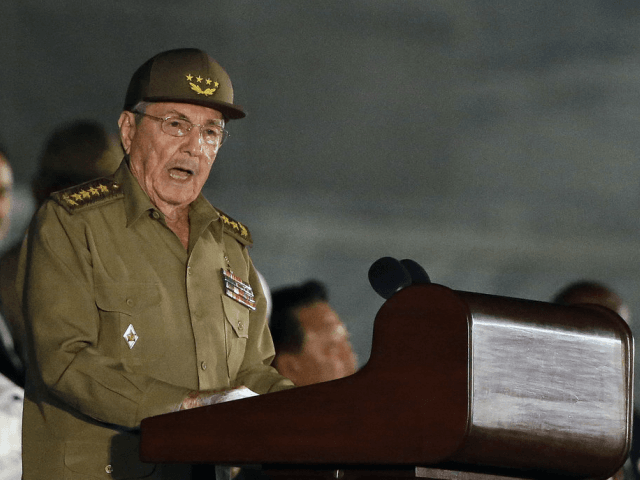Cuban dictator Raúl Castro did not attend Cuba’s major remembrance ceremonies for older brother Fidel, who died one year ago on November 25. Enthusiastic mourning of Castro is mandatory for Cuban citizens, and some remain imprisoned for refusing to participate.
Instead of attending himself, Castro sent a rotating cast to nationwide events that included son Alejandro Castro Espín and Vice President Miguel Díaz-Canel. Castro’s widow, Dalia Soto del Valle, and some of his large coterie of children and grandchildren also made public appearances on Sunday, at an art exposition by son Alex Castro Soto del Valle. One grandson, Fidel Castro Smirnov, delivered an address on Friday in eastern Santiago de Cuba, where he declared that “Fidel’s DNA is present in millions of revolutionaries today.”
Raúl Castro was notably absent among those commemorating his brother, seemingly the only known relative of Fidel’s who did not make a public appearance.
After multiple Cuban exile publications noted his absence on Monday, the top story on the homepage of Cuban state propaganda newspaper Granma at press time blared that Raúl Castro appeared in the flesh at the funeral of another communist figurehead, “revolutionary combatant” Armando Hart. The government has not provided any reason for Castro to have skipped the ceremonies. Castro did take the lead at funeral services for his older brother and delivered the news that he had died to the world via his presidential desk last year. Raúl Castro has governed Cuba since 2008, when the elderly Fidel stepped down from his position. He would later appear periodically in photos with like-minded world leaders like Hugo Chávez and Iranian President Hassan Rouhani.
While the head of government himself may have been able to skip the ceremonies, this is not a privilege bestowed to average Cubans. Children who excel in school are forced into the “Young Pioneers” program, which indoctrinates them in Marxist thought. A video surfaced this week of a group of Young Pioneers forced to recite a poem in Fidel’s honor, in which they declared him “every girl’s boyfriend.” Elián González, the Cuban refugee abducted and forced back into the regime’s hands by the Clinton administration, delivered a speech denying that Castro ever died. Puerto Rican terrorist Oscar López Rivera, whose multi-decade prison sentence was commuted by former president Barack Obama, also made a week-long appearance and visited Castro’s tomb.
Cuban police took care to arrest en masse members of some of the most prominent dissident groups, the Ladies in White and Patriotic Union of Cuba (UNPACU). At least one UNPACU member, Bartolo Cantillo, was arrested and sentenced to a year in prison for desacato (“disrespect”) on Friday, according to Cubanet. Police detained at least 40 Ladies in White members who chose to march in silence on Sunday, as they do every weekend against the government, despite the Fidel commemoration ceremonies.
Last year, police arrested the head of the Christian Liberation Movement (MCL), Eduardo Cardet, and sentenced him to three years in prison for allegedly refusing to sign a condolence book for the dictator. Cardet remains in prison today.
The theme at all of Cuba’s events commemorating Fidel Castro’s death appeared to be, as Diario de Cuba noted, rejecting the notion that Castro had died at all. Granma declared that “Fidel will never leave” in its headlines about the anniversary. References to Castro’s “immortality” appeared in several speeches during the ceremonies.
Raúl Castro has claimed he will step down in 2018, with Díaz-Canel touted as the likely successor, barring an intervention from another member of the Castro family.

COMMENTS
Please let us know if you're having issues with commenting.